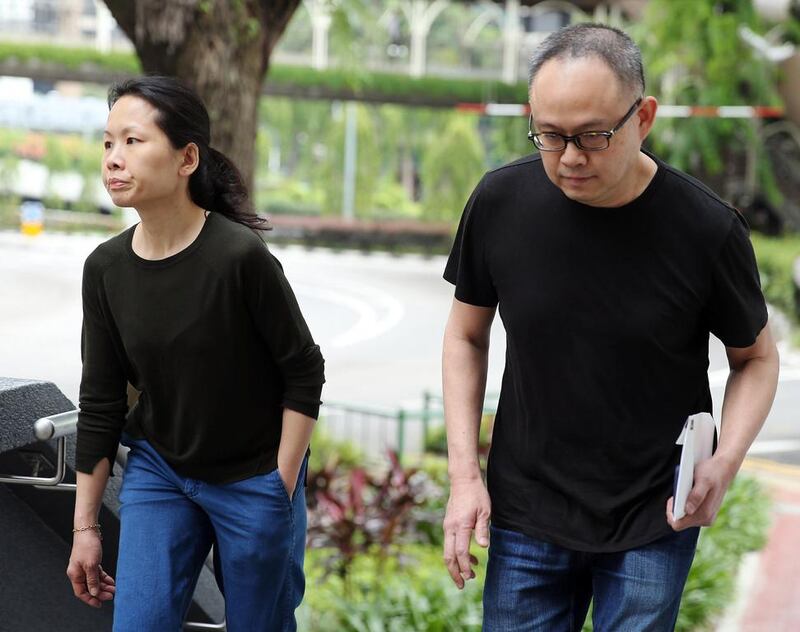Singapore // A Singapore couple who starved their Philippine maid until she weighed just 29 kilograms were ordered jailed on Monday in a case described as “shocking” by prosecutors who vowed to seek stiffer sentences.
Trader Lim Choon Hong, 48, was sentenced to three weeks in jail and fined 10,000 Singapore dollars (Dh26,400), while his wife Chong Sui Foon, also 48, was jailed for three months, the couple’s lawyer said.
Critics were outraged by what they saw as lenient penalties for the couple, who will remain free on bail pending the prosecution appeal for tougher penalties.
Both were convicted last year of violating employment laws by failing to provide enough food for their maid, Thelma Oyasan Gawidan, over a 15-month period in 2013 and 2014 at their condominium in the posh Orchard Road area.
State prosecutors, who have described the systematic starvation as “downright shocking in its extremity and severity”, are pushing for the pair to be jailed for the maximum 12 months.
Ms Gawidan, who is in her 40s, had stopped menstruating because she was getting only 75 per cent of the recommended level of iron, a nutrition expert testified at the trial.
She was also losing her hair because she was taking less than half her requirement of zinc, according to the expert.
“Simply put, she was wasting away,” the prosecutors said in a submission to the court.
“It is sickening that the victim had been forced to endure inhumane treatment of such cruelty and duration in what must have been for her an unspeakably hellish and unbearable existence.”
They said the poor quality and small quantity of food fed to Ms Gawidan “are intuitively repugnant to basic notions of humane and ethical treatment in a developed society”.
Ms Gawidan lost almost 20kg during her time working for the couple, who only allowed her to eat two meals a day – usually a few slices of white bread and small portions of instant noodles prepared by Chong.
They also packed meagre meals for her when she went with the family on holiday to Hong Kong, the court heard.
The nutrition expert testified that the maid’s daily calorie intake was only about 900 calories, much less than the 1,700 calories she needed to sustain her normal activities.
Ms Gawidan had no access to her mobile phone and was not allowed to go out on her own to buy food.
She was only allowed to shower once or twice a week and could only use the condominium’s common toilet.
“Moreover, she was subject to even more degrading treatment ... she suffered the indignity of [the wife] standing inside the toilet while she showered so as to monitor her,” the prosecutors said.
Ms Gawidan ran away in April 2014 and called a compatriot for help, a decision the prosecutors said could have saved her life.
She was taken to a migrant workers’ shelter which helped her file a complaint with Singapore’s ministry of manpower.
Prosecutors said the couple paid Ms Gawidan, who now works for another employer, S$20,000 to settle civil claims, and the manpower ministry said it had permanently barred them from employing overseas domestic workers.
The couple’s lawyer, Raymond Lye, said they were “remorseful and sincere in expressing their regret”.
But netizens were seething in online comments.
"These two aren't human and should be treated the same way they deemed fit to treat another human," wrote one netizen by the name of Jamie Yeo on the Facebook page of the local newspaper The Straits Times.
“How can such human beings even exist? Don’t they feel ashamed of themselves? They have money to employ a helper but no money to provide proper food. Extremely disgusted with them,” wrote another user by the name of Dan Ang.
Many Singapore households depend on foreign domestic help. In 2016 there were 239,700 foreign maids working in the affluent city-state, mostly from Indonesia and the Philippines.
John Gee, head of the research team for the rights group Transient Workers Count Too, said cases of domestic helpers being given inadequate food “happen with alarming regularity”.
“This is definitely a familiar practice, especially by employers who want to save money,” Mr Gee said, adding that although overall living and working conditions for domestic helpers in Singapore had improved, “a lot more needs to be done”.
Jolovan Wham, executive director of Humanitarian Organisation for Migration Economics, said at least 30 per cent of the domestic helpers who approached his organisation in the past six months complained of “inadequate food”.
“Thelma’s case made it to court because it was so egregious,” Mr Wham said, adding that his group was approached by an average of 20 domestic helpers a week.
Manpower ministry rules require employers to provide “adequate” food, “acceptable” accommodation and medical treatment for domestic helpers.
The guidelines suggest three meals a day. An example of what adequate food means includes four slices of bread with spread for breakfast and one bowl of rice, with three-quarters of a cup of cooked vegetables, a palm-sized amount of meat and fruit for lunch and dinner.
* Agence France-Presse and Reuters





